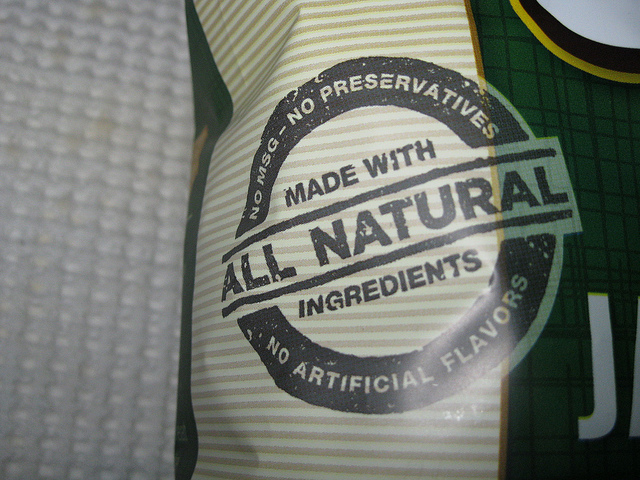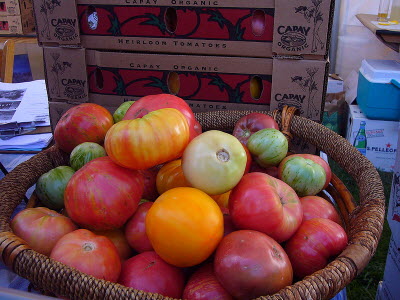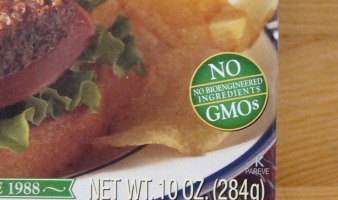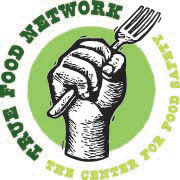Think twice before believing GMO advocates who argue that genetically engineered foods are safe because they were approved by government agencies. New report from the Union of Concerned Scientists demonstrates the many ways in which corporations influence scientific and policy making processes.
|
|
|||
|
All Natural chips made by Frito-Lay may not be so natural after all, says a new lawsuit alleging that the snack-maker is misleading consumers with its all natural claims when in fact the products are made from genetically modified ingredients. The recent lawsuit against ConAgra Foods challenges the “pure” and “100% natural” labeling on the popular line of Wesson cooking oils allegedly made with genetically modified corn and soybeans. Watch this discussion about the nature of the suit. Two class action suits challenge the “pure” and “100% natural” labeling of ConAgra’s line of Wesson cooking oils. Can something genetically modified be also natural and pure? Genetically modified crops reinforce genetic homogeneity and promote large scale monocultures, they increase vulnerability of crops to climate change, pests and diseases and thus contribute to the decline in biodiversity. In the age where 75% of our plant genetic diversity has been lost, we must ask whether GMOs are doing more harm than good. The organic food sector grew last year by nearly 8 percent, far out-pacing the overall stagnant U.S. food industry and providing new jobs. Consumers continue voting organic with their dollars. Scientists at the University of Bristol have discovered a previously unknown route by which GM genes may escape into the natural environment leading to questions about the unintended patented gene flow. With Non GMO Month around the corner, let’s return to the basics: why avoid GMOs? Among concerns, human and animal health, environmental impact, morals and ethics, socioeconomic issues, and food labeling. The first ever Non-GMO Month is coming this October with 10 10 10, or Non-GMO Day, serving as the highlight day of the month. Check out a list of participating vendors and start transitioning to non-gmo today. In a somewhat positive news for consumers, Hunt’s ketchup product line will no longer contain contain high fructose corn syrup, ConAgra Foods announced on Monday. The high fructose corn syrup will be replaced with sugar from sugar cane. It’s well documented that the conventional factory-farm method of raising animals for food – especially cattle – is an energy-intensive, inhumane (for animals and workers), water-guzzling, poisonous-emissions-releasing, earth-polluting endeavor… Omnivores who have no interest in giving up their bacon or steaks should switch to sustainable, humane versions of their favorite proteins. Immediately. Until recently, not many consumers were aware of the widespread use of a toxic and environmentally damaging chemical, hexane, in the manufacturing of “natural” soyfoods such as vegetarian burgers, nutrition bars, and protein shakes. The use of chemical solvents such as hexane is strictly prohibited in organic food processing, yet its use is widespread in the “natural” soy industry, including in some products labeled as “made with organic soybeans,” such as Clif® Bars. Hexane, a neurotoxin, is listed as a “hazardous air pollutant” by the U.S. Environmental Protection Agency (EPA), and grain processors, including soy processors, are responsible for more than two-thirds of all hexane emissions in the United States. The Institute for Responsible Technology (a.k.a. The Campaign for Healthier Eating in America) together with the Center for Food Safety, have updated their Non-GMO Shopping Guide. The updated Guide includes new features, such as a free iPhone App, ShopNoGMO, and it also cross-references products that participate with the Non-GMO Project’s third party GMO Avoidance Verification Program. A new Non-GMO Shopping Guide is now available from the Non-GMO Project featuring tips on avoiding GMOs and a list of food companies that have made a commitment to providing GE free products. We recommend that you check it out. Our friends a The Center For Food Safety have released an updated Shoppers Guide to Avoiding Genetically Engineered Foods. The guide is helpful because currently United States has no labeling requirements for foods and consumers have no way of knowing if the foods they eat contain or are likely made of genetically engineered ingredients.G Whole Foods announced that it is partnering with the Non-GMO Project to use the Project’s Product Verification Program (”PVP”) to certify Whole Foods’ private labeling food line as being free from genetically modified ingredients. This Pocket Shopper’s Guide to Avoiding GE Foods published by The Center for Food Safety answers the most pertinent and urgent consumer question about genetically modified foods. Which supermarket foods are genetically engineered? This is the second of a two part series which explores the biotech industry’s defense of GMOs. The article below explores the common application of genetic technology today in greater detail. The most common application of genetic technology today is in the food and pharmaceutical industries. There are several methods to achieve the exchange of DNA from one living organism into another. Read about the scientific process behind genetic modification. |
|||
|
 |
|||











